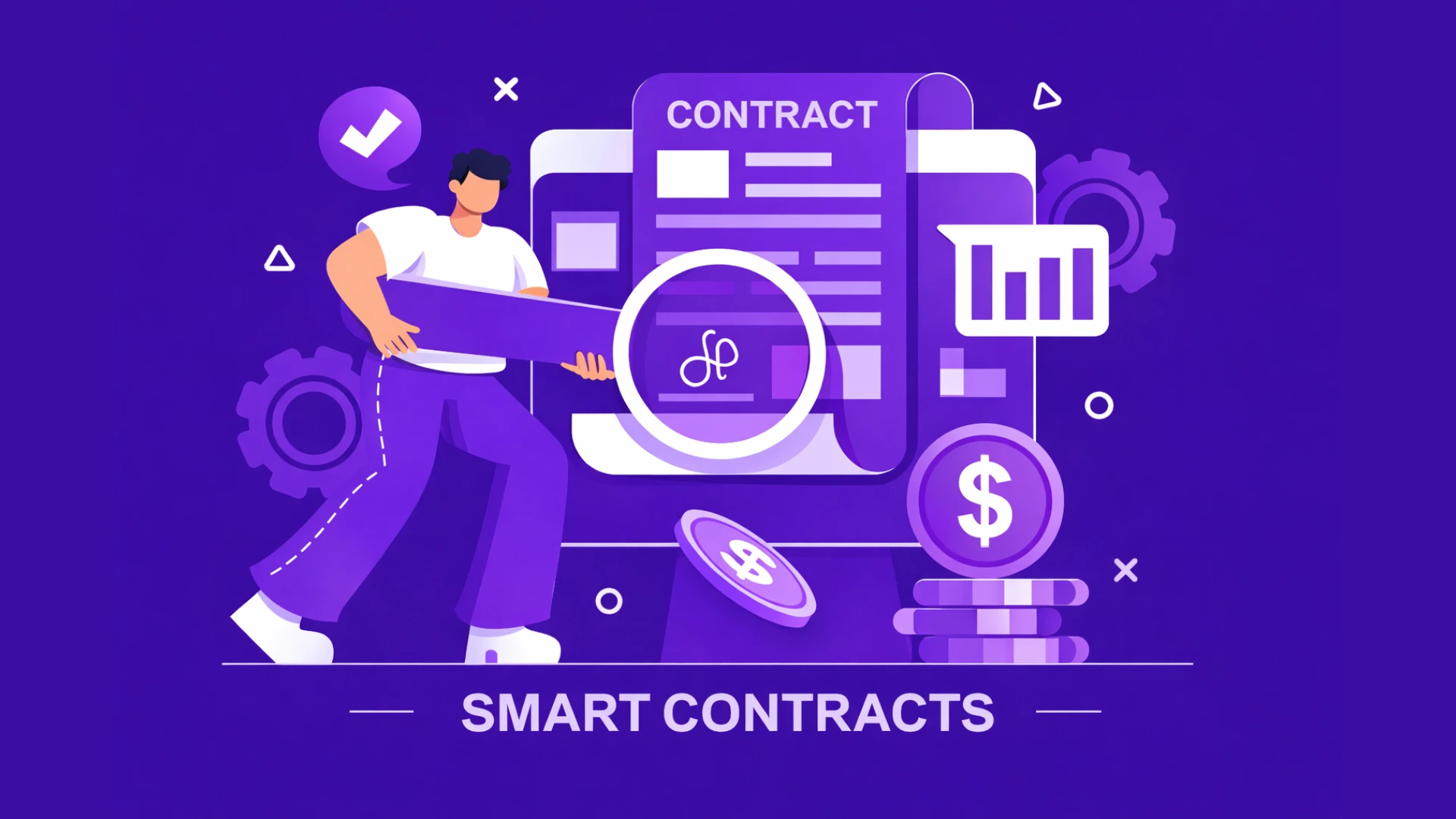✓
Key Takeaways
- 1Enable bug fixes post-deployment by upgrading contract logic without losing user funds or disrupting live applications.
- 2Preserve contract address and state, allowing users to interact with the same address while features evolve behind the scenes.
- 3Introduce centralization risks since upgrade authority holds power, strong governance and access controls are essential.
- 4Proxy patterns are industry standard, with UUPS and Transparent Proxies dominating modern upgradeable contract designs.
- 5Storage layout must be handled carefully because incorrect upgrades can corrupt data and permanently lock funds.
Introduction to Upgradeable Smart Contracts
Blockchain’s promise of immutability creates a paradox for developers: how do you fix bugs or add features to bytecode in smart contract that cannot be changed? Upgradeable smart contracts solve this fundamental challenge, enabling teams to evolve their applications while preserving user assets, contract addresses, and accumulated state data.
After eight years of blockchain development and deploying over 200 contract upgrades securing more than $2 billion in total value locked, our team has seen upgradeable smart contracts transform from controversial workaround to industry standard. Today, virtually every major DeFi protocol, NFT marketplace, and enterprise blockchain application uses some form of upgrade mechanism.
This guide explores why upgradeable smart contracts exist, how they work technically, when to use them, and how to implement them securely. We cover common patterns, security considerations, governance mechanisms, and best practices drawn from real-world deployments. Whether you’re a developer choosing architecture or a stakeholder evaluating project risks, understanding upgradeability is essential.
What Are Upgradeable Smart Contracts?
Upgradeable smart contracts are blockchain applications designed to allow their logic to be modified after deployment while maintaining the same address and preserving stored data. They achieve this through architectural patterns that separate the contract’s storage from its executable code, enabling developers to swap out the code while keeping everything else intact.
The core concept involves a proxy contract that users interact with directly. This proxy holds all the storage (user balances, settings, accumulated data) but delegates actual function execution to a separate implementation contract. When an upgrade occurs, the proxy simply points to a new implementation, users continue interacting with the same address, completely unaware that underlying logic changed.
This architecture enables upgradeable smart contracts to deliver benefits impossible with traditional immutable contracts: bug fixes, feature additions, gas optimizations, and protocol evolution. However, it also introduces complexity and risks that require careful management, the power to upgrade is significant and must be governed responsibly.
Simple Analogy: Think of smart contract solutions like a building where the address stays the same, tenants (stored data) remain in their apartments, but the management company (contract logic) can be replaced. The building doesn’t move; only the rules for how it operates can change.
Why Immutability Can Be a Challenge
Immutability is blockchain’s superpower, but it’s also its limitation. When code cannot change, bugs become permanent, optimizations remain unrealized, and protocols cannot evolve with user needs. The history of blockchain is filled with projects that suffered catastrophic losses from bugs that would be trivial fixes in traditional software.
The DAO hack in 2016 demonstrated this vividly: a vulnerability in immutable code enabled $60 million in losses. More recently, countless DeFi exploits have drained billions from protocols where discovered vulnerabilities couldn’t be patched quickly enough. Upgradeable smart contracts emerged as the practical response to these real-world challenges.
How Upgradeable Smart Contracts Work
The technical foundation of upgradeable smart contracts relies on a Solidity feature called delegatecall. This low-level function overlapping in smart contracts allows one contract to execute another contract’s code while using its own storage. The proxy contract uses delegatecall to run the implementation contract’s functions as if they were its own, keeping all state changes in the proxy.
When a user calls a function on the proxy, the proxy’s fallback function catches the call and forwards it to the current implementation address via delegatecall. The implementation executes the logic but writes results to the proxy’s storage. Upgrading simply means changing which implementation address the proxy delegates to, all storage remains untouched.
| Component | Role | Changes During Upgrade? |
|---|---|---|
| Proxy Contract | User-facing address, holds all storage | ❌ Never changes |
| Implementation Contract | Contains business logic and functions | ✅ Replaced on upgrade |
| Storage Layout | Variable organization in proxy slots | ⚠️ Must remain compatible |
| Admin Address | Controls upgrade permissions | 🔄 Can be transferred |
| User Data | Balances, settings, state | ❌ Preserved automatically |
How Upgradeable Smart Contracts Process Calls
delegatecall enables implementation code to run in proxy’s storage context
Upgradeable Smart Contracts Architecture
Common Upgrade Patterns in Smart Contracts
Several architectural patterns have emerged for implementing upgradeable smart contracts, each with distinct trade-offs. The choice of pattern impacts gas costs, security characteristics, and operational complexity. Understanding these options helps teams select the right approach for their specific requirements.
The most widely adopted patterns are Transparent Proxy, UUPS (Universal Upgradeable Proxy Standard), and Diamond (EIP-2535). OpenZeppelin’s libraries provide battle-tested implementations of the first two, making them accessible to most development teams. Diamond offers greater flexibility but with increased complexity.
| Pattern | Upgrade Logic Location | Gas Efficiency | Best For |
|---|---|---|---|
| Transparent Proxy | Proxy contract | Lower (extra checks) | Simple projects, beginners |
| UUPS | Implementation contract | Higher (minimal proxy) | Gas-sensitive, experienced teams |
| Diamond (EIP-2535) | Diamond contract | Variable | Large, modular systems |
| Beacon Proxy | Beacon contract | Good for mass deploys | Many identical contracts |
Benefits of Using Upgradeable Smart Contracts
The advantages of upgradeable smart contracts extend far beyond simple bug fixing. They enable entirely new approaches to protocol development, user protection, and competitive positioning in the fast-moving blockchain industry.
Security patching represents the most compelling benefit. When vulnerabilities are discovered, either through audits, bug bounties, or unfortunately through exploits, upgradeable smart contracts allow immediate response. Teams can deploy fixes within hours rather than facing the impossible choice between losing funds or hard forking the entire chain.
Rapid Bug Response
Deploy security patches immediately when vulnerabilities are discovered, protecting user funds.
Feature Evolution
Add new functionality over time without requiring users to migrate to new contracts.
Gas Optimization
Implement efficiency improvements as compiler technology and techniques advance.
Address Continuity
Preserve contract address for integrations, UIs, and user trust across upgrades.
Use Cases for Upgradeable Smart Contracts
Upgradeable smart contracts find application across virtually every blockchain vertical. Understanding where they’re used helps illustrate both their utility and the industry-wide acceptance of this pattern.
DeFi protocols represent the largest adopters. Aave, Compound, Uniswap (governance contracts), and most lending, trading, and yield protocols use upgradeable smart contracts. These projects manage billions in user funds and require the ability to respond to market conditions, security discoveries, and competitive pressures with protocol improvements.
NFT marketplaces like OpenSea and Blur rely on upgradeable contracts to add new trading features, optimize gas costs, and respond to user feedback. According to 101blockchains blogs, Enterprise blockchain applications use upgradeability to meet evolving compliance requirements and business needs. Stablecoins use it for regulatory compliance and reserve management updates.
Industry Reality: In our eight years of development, we’ve found that 90%+ of serious projects managing significant value choose upgradeable smart contracts. The practical benefits far outweigh theoretical purity arguments about immutability, as long as proper governance exists.
Security Layers for Upgradeable Contracts
Protecting Upgradeable Smart Contracts
Security Risks and Considerations
Upgradeable smart contracts introduce risks absent from immutable contracts. Understanding these risks enables teams to implement appropriate safeguards and users to evaluate project trustworthiness accurately.
The most fundamental risk is centralization of power. Whoever controls upgrade authority can potentially modify contract behavior arbitrarily, including stealing funds if malicious or compromised. This power concentration contradicts smart contract integration in blockchain decentralization ethos and creates a trust requirement that purely immutable contracts avoid.
| Risk Category | Severity | Mitigation Strategy |
|---|---|---|
| Admin Key Compromise | Critical | Multi-sig, hardware wallets, MPC |
| Storage Collision | Critical | Storage gap pattern, tooling validation |
| Initialization Attacks | High | Disable initializers in implementation |
| Function Selector Clash | Medium | Transparent proxy, careful naming |
| Malicious Upgrade | Critical | Timelocks, governance, audits |
Governance and Control in Upgradable Contracts
Governance mechanisms determine who can upgrade contracts and under what conditions. Well-designed governance balances responsiveness (quick security fixes) against safety (preventing malicious changes). Most mature projects implement layered governance appropriate to their stage and risk profile.
Multi-signature wallets represent the minimum standard for upgradeable smart contracts governance. Requiring 3-of-5 or 4-of-7 signatures from geographically distributed team members prevents single points of failure. More sophisticated setups use MPC (Multi-Party Computation) for even stronger key security.
Timelocks add a crucial defense layer by delaying upgrade execution. A 48-hour timelock gives users time to review proposed changes and exit if they disagree, critical for maintaining user trust in upgradeable smart contracts. Emergency response mechanisms may bypass timestamps smart contracts but should require supermajority approval and be carefully constrained.
Token-based governance represents the gold standard for mature protocols. Proposals go through community discussion, smart contract in voting periods, and execution delays. This approach aligns upgrade power with stakeholder interests while maintaining sufficient agility for protocol evolution.
Best Practices for Implementing Upgrades
Implementing upgradeable smart contracts safely requires adherence to proven practices. These guidelines, refined through countless deployments and security incidents, help teams avoid common pitfalls.
✓
Use OpenZeppelin Libraries
Battle-tested implementations reduce custom code risk. Don’t reinvent proxy patterns unless you have exceptional security resources.
✓
Maintain Storage Gaps
Reserve empty storage slots in base contracts for future variables. This prevents storage collisions when adding state.
✓
Test Upgrade Paths
Fork mainnet, simulate upgrades, and verify state preservation before any production deployment.
✓
Audit Every Upgrade
Each implementation change requires security review. Treat upgrades with the same rigor as initial deployment.
Common Upgrade Mistakes to Avoid
Storage Reordering
Changing variable order corrupts existing data
Skipping Initializers
Unprotected init functions get front-run
Single Key Control
One compromised key loses everything
No Timelock
Users can’t review changes before execution
Avoiding Pitfalls with Upgradeable Smart Contracts
Common Mistakes to Avoid
After deploying over 200 upgrades and auditing countless more, our team has catalogued the mistakes that cause most problems with upgradeable smart contracts. Learning from others’ errors prevents costly lessons.
Storage layout violations top the list. Adding new local variables in smart contracts between existing ones, changing variable types, or removing variables corrupts data in ways that may not be immediately apparent but can cause catastrophic failures later. Always add new storage at the end and never modify existing slot assignments.
Forgetting to disable implementation initializers creates attack vectors. If the implementation contract’s initializer can be called directly (not through the proxy), attackers can take control. Always call _disableInitializers() in implementation constructors for UUPS patterns.
Neglecting upgrade testing on mainnet forks causes preventable disasters. Test every upgrade path by forking production state, executing the upgrade, and verifying all functions work correctly with real data. Automated upgrade safety checks should be part of every CI/CD pipeline for upgradeable smart contracts.
Future of Upgradeable Smart Contracts
The trajectory of upgradeable smart contracts points toward more sophisticated governance, better tooling, and increasing standardization. Several trends will shape how this technology evolves over the coming years.
Progressive decentralization models are gaining traction. Projects launch with team-controlled upgrades for agility, then transition to token governance as they mature. This approach balances early-stage development needs with long-term decentralization goals, we expect this pattern to become standard for upgradeable smart contracts.
Formal verification tools will become essential for upgrade safety. Mathematical proofs that new implementations preserve critical invariants provide assurance beyond traditional testing. As tooling matures, we expect formal verification to become standard practice for significant upgrades.
Cross-chain governance will enable upgradeable smart contracts deployed across multiple networks to be managed cohesively. As protocols become increasingly multi-chain, coordinated upgrades across deployments will require new tooling and processes that are currently being developed.
Need Help with Upgradeable Contract Architecture?
Our team brings 8+ years of experience and 200+ successful upgrades to every project. From architecture design to secure deployment, we deliver production-grade upgradeable smart contracts.
Frequently Asked Questions
Upgradeable smart contracts are blockchain programs that can be updated after they are deployed. Normally, smart contracts cannot be changed once live. Upgradeable contracts solve this by separating data and logic. This allows developers to fix bugs, add new features, or improve performance without changing the contract address or losing user funds.
In 2026, blockchain apps handle huge value and complex logic. Bugs, security risks, and new requirements are common. Upgradeable smart contracts help projects stay secure and competitive by allowing updates without redeploying contracts. This protects users, avoids fund loss, and supports long-term growth, making them essential for modern Web3 projects.
Upgradeable smart contracts work using a proxy system. Users interact with a proxy contract that stores data. The proxy sends function calls to a separate implementation contract that contains the logic. When an upgrade is needed, the proxy is linked to a new implementation. Data stays safe, and users keep using the same contract address.
Upgradeable smart contracts can be safe if built correctly. They introduce risks like misuse of upgrade power or storage errors. To stay secure, projects use audits, multi-signature wallets, timelocks, and governance voting. When proper security practices are followed, upgradeable contracts are widely trusted and used by major DeFi and Web3 platforms.
The proxy pattern is the most common method for making contracts upgradeable. A proxy contract holds all user data and forwards calls to a logic contract. Popular proxy types include Transparent Proxy and UUPS. This design allows logic changes without affecting stored data, helping developers safely upgrade blockchain applications over time.
Storage layout defines how data is stored inside a contract. In upgradeable smart contracts, changing the order or type of storage variables can break the contract or corrupt data. Developers must only add new variables at the end and never change existing ones. Correct storage handling prevents locked funds and serious system failures.
Upgrade control usually belongs to an admin, multi-signature wallet, or governance system. Early-stage projects often use team-controlled upgrades, while mature protocols use community voting. Timelocks are added so users can review changes before upgrades happen. Good governance ensures upgrades improve the system without abusing user trust.
Yes, most major DeFi projects use upgradeable smart contracts. Platforms like Aave, Compound, and Uniswap rely on them to fix bugs, improve features, and respond to security issues. Managing millions or billions in user funds requires flexibility. Upgradeable contracts provide that flexibility while keeping user assets and addresses safe.
Reviewed & Edited By

Aman Vaths
Founder of Nadcab Labs
Aman Vaths is the Founder & CTO of Nadcab Labs, a global digital engineering company delivering enterprise-grade solutions across AI, Web3, Blockchain, Big Data, Cloud, Cybersecurity, and Modern Application Development. With deep technical leadership and product innovation experience, Aman has positioned Nadcab Labs as one of the most advanced engineering companies driving the next era of intelligent, secure, and scalable software systems. Under his leadership, Nadcab Labs has built 2,000+ global projects across sectors including fintech, banking, healthcare, real estate, logistics, gaming, manufacturing, and next-generation DePIN networks. Aman’s strength lies in architecting high-performance systems, end-to-end platform engineering, and designing enterprise solutions that operate at global scale.







